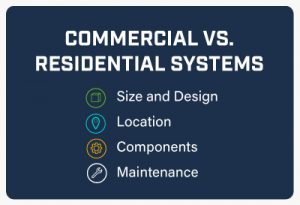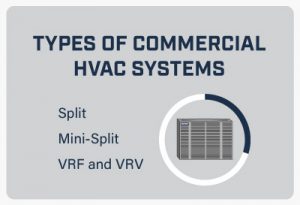New Business Owners’ Guide to Commercial HVAC Systems
Commercial and residential HVAC systems share core functions—cooling, heating, and ventilating a designated space. However, commercial units differ in terms of components, mechanisms, and scale. If you are a new business owner looking to find the best heating and AC system for your building, our technicians explain everything you need to know.
How Commercial HVAC Systems Work
All heating and cooling systems are designed to maintain an ideal indoor air climate. This is achieved through cooling units working in the summer, warming systems in the winter, and helping to control humidity as necessary. While units are complex machines with lots of intricacies, the basics essentially break down like this:
- Air Conditioning components utilize refrigeration or water-cooling systems to remove heat from the air.
- Heating elements rely on gas, radiator coils, or water systems to heat the air.
- Ventilation systems distribute the warm or cool air throughout the space and help filter out any particles or debris.
While commercial and residential HVACs perform the same tasks, commercial units tend to be more complicated, so we recommend consulting with a heating and cooling expert like one of our NATE-Certified contractors. We will help ensure the right system gets installed for your building while keeping efficiency and cost in mind.
How do Commercial Systems Differ from Residential Ones?
When deciding on a commercial unit, there are specific elements to be aware of that you might not need to worry about with a home system. For example:
- Size and Design: Commercial HVAC systems are much larger than average domestic models. Plus, they need to be designed specifically for your building space. Incorrectly-sized units can end up costing more in utility costs and put extra strain on components, leading to damage.

- Location: The placement of your unit is crucial for businesses. You might install large equipment on rooftops, in a maintenance area, or arrange smaller units in specific zones. Where your system is situated has a significant impact on efficiency, noise level, and accessibility. Work with our HVAC installers to determine the optimal location.
- Components: AC and heating components differ in commercial models. For example, they often require multiple pipes for proper drainage and complex thermostats. They also have different condensers, blowers, compressors, and dampers.
- Maintenance: All HVACs should be serviced on a regular basis, but commercial units require the utmost in routine, professional care. Due to commercial systems’ complexities, skilled technicians should be contracted to keep everything running smoothly and efficiently.
What are the Most Common Types of Commercial HVAC Systems?
When considering a new heating and AC unit for your building, the type of commercial system is crucial for proper heating and cooling. The three main categories are:
- Split: Ideal system for small businesses that don’t have a lot of room to house larger equipment.
- Mini-Split: Ductless system that allows owners to control air climate in individual rooms or designated areas.
- VRF and VRV: Perfect for large buildings that might need to heat some parts of the commercial space while simultaneously cooling down others.
Chat with one of our HVAC professionals and receive advice on the best type of system for your needs and budget.
Work With Our Expert Commercial HVAC Contractors
AAA Heating and Cooling provides your business with exceptional HVAC design, professional installation, and expert maintenance. We have over 50 years of experience serving our community, so it’s no surprise we are considered Beaverton and Portland’s heating and cooling experts. Schedule an appointment with one of our professional HVAC contractors today.